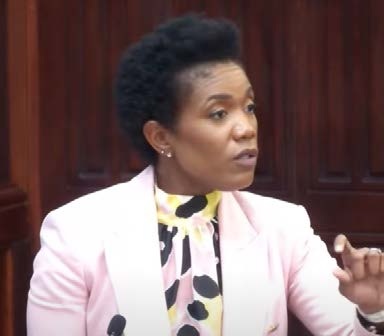Barbados Minister Defends Cybercrime Bill to Address Online Bullying and Defamation

February 6, 2024
Newly appointed Minister of Industry, Innovation, Science, and Technology defends the government's Cybercrime Bill, aimed at reducing online defamatory attacks and bullying while not restricting free speech.
Newly appointed Minister of Industry, Innovation, Science, and Technology Marsha Caddle has defended the government’s new Cybercrime Bill, claiming that its goal is not to restrict general free speech, but rather to reduce the number of defamatory attacks and bullying online.
Speaking on Monday’s Down to Brasstacks call-in programme on Voice of Barbados, she denied that the government is seeking to muzzle public criticism. She said it was focused on online bullies whom she blamed for contributing to suicides.
“There was a period up to maybe six months ago and maybe even past that, that we were having a far higher rate of suicides, especially among young people, than we would otherwise be accustomed to,” said Caddle. “I am aware that in several of those cases, when people [investigated] some of the background to understand what drove the young people to take the action that they took, they were able to find what . . . to any reasonable person, [would] be characterised as bullying. We can’t say we have a mental health crisis, especially among young people, and not be very clear that as a society, we are not going to tolerate this kind of bullying.”
The minister stressed that the law intends to hold people accountable for defamatory and bullying efforts online and that the burden ofproof in these areas remains the same as it does in legislation protecting reputations.
She said: “Defamation under this legislation carries the same burden of proof, carries the same test of law, as defamation in any other context. Why was a Computer Misuse Act, or a Cybercrime Bill necessary? It is because more and more, the way that people publish, the way that people communicate, is not simply by standing in the street and yelling profanities about somebody. It is not simply by creating a poster and putting it on a telephone pole. More and more, the majority of the communication in which people engage is online.
“There is nothing that would be considered defamation in tech, in speech, that is not considered defamation under this law. In other words, if you would not be allowed to call in on this programme and say something about [host] David Ellis, or say somethingabout some public personality, or some private individual, then you cannot publish it online. This Act just makes reference to the place that the defamation is taking place.”
Acknowledging that some parts of the bill’s language might appear vague to the average Barbadian, she maintained that the bill’s references to people seeking to cause “annoyance, inconvenience, danger, obstruction, embarrassment, insult, injury, humiliation, intimidation, hatred, anxiety or causes substantial emotional distress” are all terms recognised in law, and have to be proven in court before any judgment can be passed.
“Let’s not forget that any of these tests, any of these qualifying statements that the legislation highlights have to be proven,” the minister added. “It has to be that the person who is the complainer had a reason to feel threatened, to feel there was a threat against their life, their family or their property.”
Protecting free expression, though crucial, could not be at the expense of permitting defamatory conduct to go unchecked, she told listeners.
She said: “Do we feel that it is reasonable to originate a story, something about someone, without regard to if it is true? You say freedom of expression, and just as you bring a charge about vagueness of the law, there is vagueness as well when people talk about freedom of expression. A person is not at liberty to say whatever he or she wants without regard to the damage that it does to a person.” [email protected] If you or someone you know is struggling with suicidal thoughts or problems with their mental health, contact the Assessment Unit at the Psychiatric Hospital at 536-3091/536-309, or Lifeline Barbados, the Ministry of Health and Wellness support hotline, at 436-4500. (SB)


